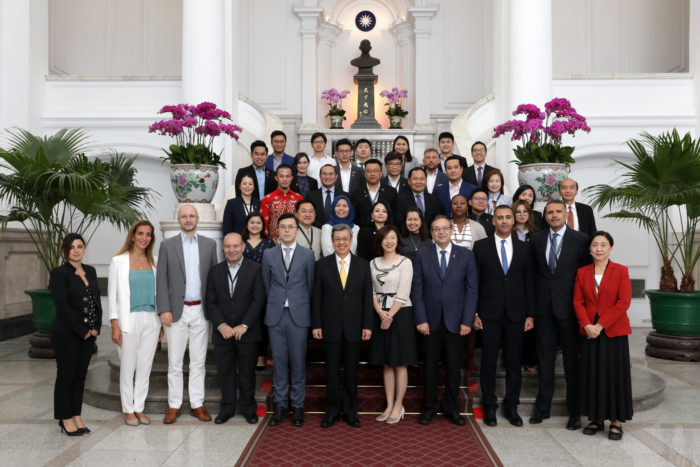
Taiwan is a democratic and developed East Asian country of around 24 million people. However, in terms of diplomatic relations, most of the world considers it as part of China. At present, Taiwan is left with only 15 formal diplomatic allies, down from 22 when incumbent President Tsai Ing-wen first came to office in 2016.
As President Tsai prepares for presidential elections in January 2020, China and the elements associated with it are once again flexing their muscle. Apart from isolating Taiwan diplomatically, digital disinformation has also been employed on a daily basis in order to destroy President Tsai and her political party, the Democratic Progressive Party (DPP), which, China believes, are leaning towards independence.
Amidst the difficulties being faced by Taiwan as a result of rising China, it has chosen to rely on the strength of its democracy. As what President Tsai said recently in a speech in Columbia University: “Our democratic system makes us open to diverse and innovative ideas, giving us the flexibility to break the mold when the mold no longer fits.”
She also recognized, however, that the same system makes them vulnerable to disinformation: “Authoritarian governments seek to exploit press freedoms unique to democratic societies to sow dissent among us. They hope to make us question our political systems and lose faith in democracy.”
It was for this reason that the Council of Asian Liberals and Democrats (CALD) chose Taipei, Taiwan as venue of its 40th CALD Executive Committee Meeting with the themes: 1) Democracy 4.0: Innovating Democracy through Technology; and 2) Defending Democracy Against Disinformation. The events, which took place on 18-23 October 2019, were attended by around 50 international delegates from 18 countries across the world (Asia, Middle East and North Africa, Sub-Saharan Africa, North America, Latin America and Europe).
Taiwan’s Digital Minister, Audrey Tang, was the keynote speaker for the Democracy 4.0 forum. Tang, who also spoke in CALD’s 25th Anniversary in Bangkok, Thailand last year, again emphasized the need to open the space for citizen participation. “We must create a space for conversation between diverse values. Recreating space for diverse values has been the focus of the digital space in Taiwan, so that we can respond to new social developments without over-relying on the old hierarchical way.”
The forum also had sessions on understanding the value of technology in politics, hacking solutions to governance issues and building political parties of the future. More importantly, it included a study tour where the delegates had the chance to visit Taiwan’s Social Innovation Lab (where Minister Tang holds a weekly drop-in session) and NPO Hub Taipei, which incubates and accelerates Taiwan’s impact organizations and social innovation entrepreneurs. Defending Democracy Against Disinformation, on the other hand, gathered key stakeholders from the media, civil society and politics on the issue of curbing disinformation, misinformation and hate speech. In the first session, the ecosystem of disinformation was discussed using cases from Asia (Rosalind Liu, John Nery), Africa (Nangamso Kwinana) and Latin America (Silvia Mercado). Nery, a journalist from the Philippines, suggested a counter-disinformation checklist which includes: 1) clarifying the stakes; 2) defining disinformation; 3) including Asian perspectives; 4) integrating science; and 5) following the experts.
The second session analyzed more specifically the issue of disinformation and hate speech during elections, by looking at elections held earlier this year in Indonesia (Bambang Harymurti) and the Philippines (Sarah Elago). Bambang, former chief editor of Tempo, a weekly magazine in Indonesia, started by saying that, “The first casualty of war is the truth”, and that appeared to be the case in the April 2019 Indonesian presidential elections. He discussed how the opposing sides employed disinformation, as well as the cyber attacks directed to journalists like him. He ended by quoting American President James Garfield, who said: “The truth will set you free, but first it will make you miserable”, highlighting the difficult search for the truth in the era of disinformation.
In the last session, the very controversial topic of legislation to combat disinformation was addressed with experts from Asia (Robin Ramcharan), the United States (Zachary Lampbell) and Europe (Emil Kirjas). All of them warned against the dangers of disinformation legislation on fundamental freedoms, with Lampbell stating categorically that, “Anti-fake news laws violate the freedom of expression.” He added that existing laws (tort, defamation/libel/slander, cyber-bullying, fraud, copyright) can be utilized against digital disinformation, and the key is finding the gaps in those laws so that an appropriate legislative response can be formulated.
Apart from the back-to-back forums on political innovation and disinformation, another highlight of the Taipei events was the 40th CALD Executive Committee Meeting, where representatives of the Arab Liberal Federation (ALF), Africa Liberal Network (ALN) and Red Liberal de America Latina (RELIAL) participated. Together with CALD, representatives of the regional liberal networks experienced a meeting of the minds, a “Taiwan moment” of sort, and vowed to continue their cooperation in the coming years.
The series of events was capped by a visit to Taiwan’s Presidential Office Building, where the delegation was warmly received by Taiwan’s Vice President Chen Chien-Jen.
“The topics selected for these events – technology, democracy and also dealing with disinformation or influence operations are very timely topics for all of us here”, said CALD Chairperson Bi-Khim Hsiao in her opening remarks. “ I hope that we take this opportunity to not only learn from each other, but more importantly, to help those who are facing enormous challenges and difficulties in dealing with these issues, among others, in their respective countries.” |
Categorised in: News Article
This post was written by CALD
 Unit 409, 4/F La Fuerza Plaza 2, 2241 Don Chino Roces Ave. corner Sabio St., 1231 Makati City, Philippines
Unit 409, 4/F La Fuerza Plaza 2, 2241 Don Chino Roces Ave. corner Sabio St., 1231 Makati City, Philippines
 +632 8819 60 71
+632 8819 60 71
 info@cald.org
info@cald.org